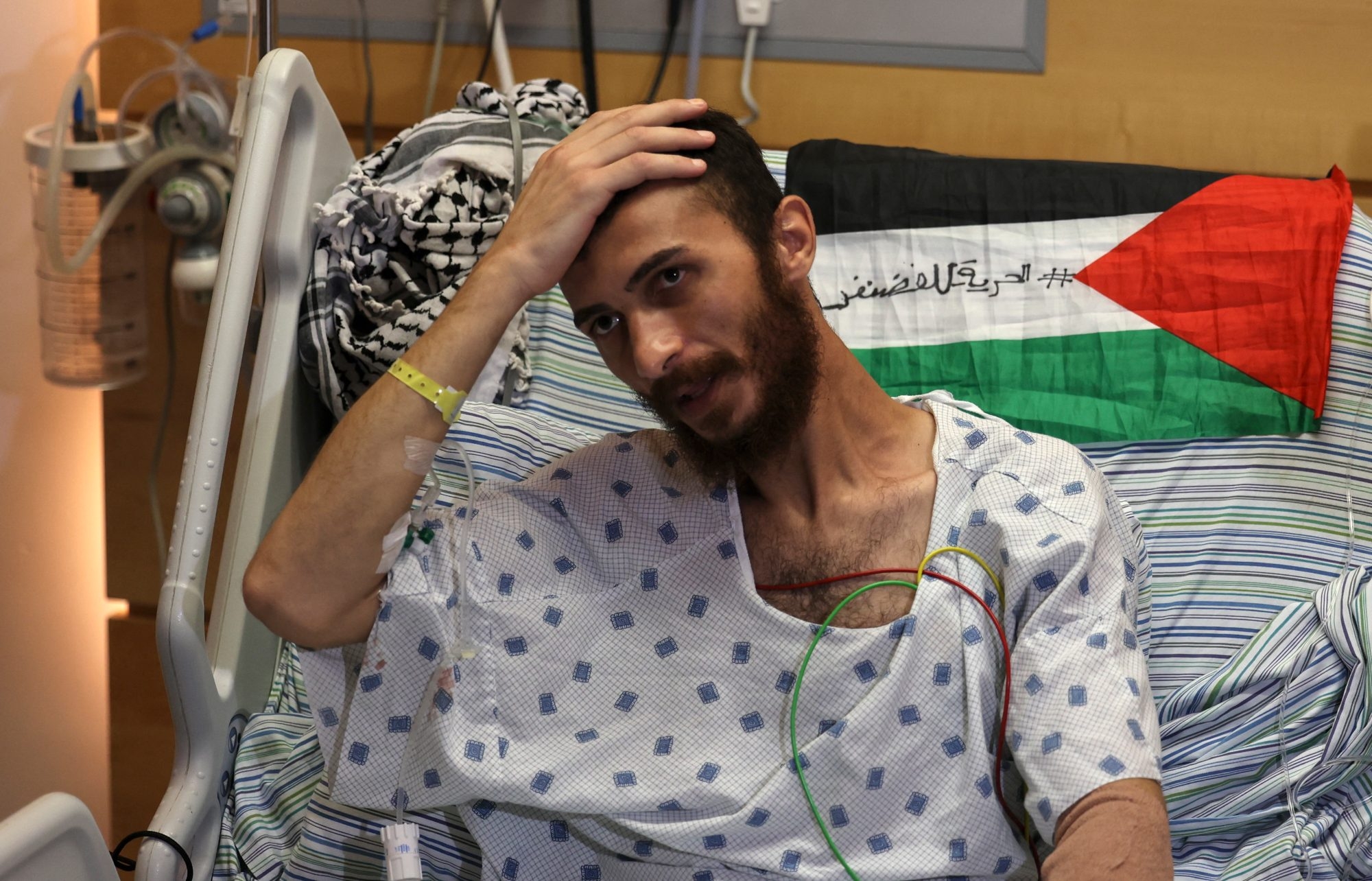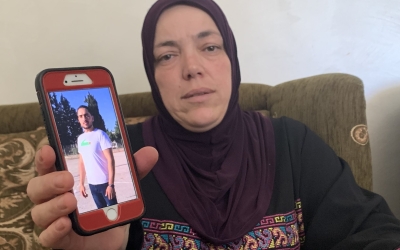Refusing food, medicine or court hearings, Palestinians fight administrative detention

Palestinians imprisoned by Israel under its contested policy of administrative detention have continued to protest their ill-treatment and repressive Israeli policies through hunger strikes and boycotting military court hearings - even if it means putting their lives and health at risk.
Under administrative detention, Israel detains individuals - overwhelmingly Palestinians - without trial or charges for renewable periods of up to six months. The policy imposes no obligation on the Israeli government to present any official suspicions or evidence to justify an arrest or detention - circumstances that critics argue violate international law.
New MEE newsletter: Jerusalem Dispatch
Sign up to get the latest insights and analysis on Israel-Palestine, alongside Turkey Unpacked and other MEE newsletters
Among six Palestinian prisoners currently undergoing an open-ended hunger strike, Miqdad al-Qawasmeh is more than two months into his strike and is now facing serious health complications, according to a statement by the Palestinian Prisoners' Society (PPS).
A 24-year-old native of the southern occupied West Bank city of Hebron, Qawasmeh recently decided to escalate his hunger strike by refusing to take any supplements or intravenous fluids.
The Palestinian Prisoners’ Affairs Committee warned in a statement that Qawasmeh’s health had sharply deteriorated, with the young man suffering from extreme weight loss, low heart rate, shortness of breath, blurry vision, migraines and severe pain, and was now unable to stand up.
While the strikes have brought attention to the fates of individual Palestinians in Israeli prisons, prisoners’ rights advocates say the movement seeks to bring attention to the sharp rise in administrative detention sentences and the broader struggle of Palestinian prisoners under the occupation.
Spike in detentions
According to the Prisoners’ Affairs Committee, three Israeli guards surround Qawasmeh at all times in the Kaplan Medical Centre in Rehovot, Israel, deliberately eating food in front of him while his right hand and left foot are cuffed to his hospital bed at all times.
Qawasmeh was arrested by the Israeli army in January, then sentenced to six months in administrative detention. His administrative detention was renewed for a second time in June, without him or his lawyers being informed of what charges were being held against him - prompting the Palestinian to launch his hunger strike alongside several other prisoners..
Qawasmeh’s brother Qutayba told Middle East Eye that lawyers were able to visit him on Thursday night, and had informed the family that he was in critical condition.
“We as a family have been living in constant fear and worry over Miqdad’s health for the past two months, and now we’re afraid of losing him in light of his ongoing hunger strike and his refusal to take supplements,” Qutayba said, stressing that Israeli authorities were deliberately neglecting his brother and refusing to even negotiate his demands.
Five other Palestinians are currently on hunger strike protesting their administrative detention. Kayed al-Fasfous, 32, has been on strike the longest, refusing food since early July to denounce being held without charges since July 2020.
Another hunger striker, Alaa al-Araj, a 34-year-old civil engineer from Tulkarem, has been imprisoned by Israel several times since 2013, for a combined five years behind bars, many of it under administrative detention.
Hisham Ismaeel Abu Hawwash, 39, has been in custody since October 2020 and received two terms of administrative detention for six months each. He is a father of five and a former prisoner, having spent a total of eight years in Israeli jails.
Rayeq Sadeq Bisharat, 44, is a resident of Tubas who was made an amputee in 2002 during the Second Intifada, imprisoned a year later and sentenced to nine years in prison. A widower, Bisharat was arrested on 23 July and sentenced to three months of administrative detention.
Shadi Abu Aker, 37, a refugee living in the Bethlehem-area Aida camp, was also arrested during the Second Intifada and released in 2012, only to be arrested once again in October 2020.
Amany Sarhana, the head of PPS’s media department, told MEE that 2021 saw one of the highest number of Palestinian prisoners on hunger strike against administrative detention in recent memory, attributing it to a sharp rise in Israel’s use of administrative detention, especially against Palestinians who had previously been imprisoned.
According to PPS, Israel has issued 869 administrative detention orders against 520 Palestinians since the beginning of 2021, including four minors - with a spike in administrative sentencing since May, with only around 200 such sentences issued in the first four months of the year.
Meanwhile, Sarhana added that the Israeli Prison Service (IPS) has placed most hunger strikers in solitary confinement, impeded their access to lawyers, and neglected to disclose information regarding their health.
She added that the conditions of solitary confinement in which the IPS put the hunger strikers were deplorable - cells were infected with insects and high levels of humidity. Furthermore, the IPS departed from the usual protocol of transferring hunger strikers to hospitals for the duration of their strike, instead opting to transfer between the hospital and the prison infirmary.
Boycotting the courts
In light of the escalation in Israel’s use of administrative detention - and longstanding criticism over its neglect of sick Palestinian prisoners - five other Palestinian prisoners held under the policy have announced that they would boycott the Israeli military courts through which their cases go through, as well as refuse to take any medicine.
These five prisoners - identified as Ayed Dudin, Yousef Qazzaz, Ahmad Abu Sundus, Yasser Budrusawi and Amin Shawki - have spent years imprisoned under administrative detention, and all suffer from chronic medical conditions necessitating regular medical attention and follow-up, PPS said.
PPS head Qaddura Fares said that the boycott of the courts was an important tool in fighting administrative detention - by refusing to recognise the legitimacy of a legal system convicting around 95 percent of Palestinians.
“We have been calling for this ever since the escalations of the occupation authority’s policy of administrative detention, as well as its targeting of activists in Palestinian society,” he said, adding that the ongoing hunger strike and court boycott could only succeed in pressuring Israel if all administrative detainees joined the movement with the support of all Palestinian factions.
'We have faith that Yousef and his comrades will succeed in ending their administrative detention and put an end to this policy'
- Myassar Qazzaz, wife of Palestinian prisoner
Qazzaz, 49, is among the five prisoners who have decided to refuse medication, despite suffering from kidney issues and serious migraines. A well-known political activist and unionist in the Hebron area, he was arrested by Israeli forces earlier this year after his nomination to run in Palestinian Authority elections - which have since been postponed.
Qazzaz’s wife Myassar told MEE that her husband has spent most of the last four years in administrative detention, and had only been free for two months before he was rearrested.
“We had first hoped that he’d be released after four months, but Israeli authorities renewed his arbitrary and unjust administrative detention another time,” she said. “I am very worried about his medical condition, especially since he has stopped taking his medications, which has led to the worsening of his condition.”
In her husband’s absence, Myassar has been left alone to raise the couple’s 15-year-old twins Khaled and Jana, born after years of struggle.
“It was difficult to have our children, and today Yousef is prevented from living a normal life as a father with his children. We suffer from his absence,” she said. “Today my children are denied their most basic right to live a normal life with their father.
“We have been suffering because of administrative detention for many long years, and we reject it completely, because it is an unjust form of imprisonment without any justification, and destroys our daily lives,” she added. “We have faith that Yousef and his comrades will succeed in ending their administrative detention and put an end to this policy.”
Middle East Eye delivers independent and unrivalled coverage and analysis of the Middle East, North Africa and beyond. To learn more about republishing this content and the associated fees, please fill out this form. More about MEE can be found here.






